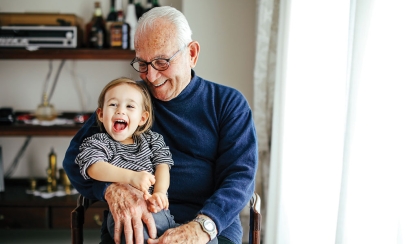
My Grandchildren Have Terrible Manners!
Q: My grandchildren don’t seem to have the foggiest idea of good table manners, or any other good manners for that matter. How can I help them improve their manners without coming across as an interfering grandparent?
A: Grandparents often serve as an example of good manners simply by their actions. My Grandma Esta’s graciousness made a lasting impression on me during one meal in particular. One of my older cousins brought his fiancée to Grandma’s home for brunch. It was the fiancée’s introduction not only to family members, but to the United States. My grandma turned to the young woman and said, “Would you like some strawberries?” To my amazement, after saying, “yes, please,” the young woman moved the serving dish to her placemat! My grandma smiled, asked who else wanted strawberries, and went to the kitchen. She returned with three serving bowls of strawberries and placed them on the three empty placemats.
The essence of etiquette is to make other people comfortable. Even as adults, we encounter challenges when we visit other countries and discover new foods or ways of interacting.
Set the stage for mealtime success at your home. The stubby fingers of a toddler have a difficult time with regular utensils; wider utensils, just like extra-thick crayons, are easier for little hands to manipulate. Without them, everything may turn into finger food. Preschoolers enjoy the independence of pouring – which can be a disaster unless a child-sized pitcher is on the table.
Learning social conventions can be joint activities. Getting the table ready for a meal when grandchildren come over can be a fun activity once the children are old enough. Why not select one of your tablecloths together? Placemats? Napkins? You might want to set aside two or three choices ahead of time or risk ending up with a fall harvest theme in the middle of February! What about a centerpiece? Where do the utensils go? Preparation time builds an investment into the experience of the meal. Then, model good table manners during the meal; hope that your adult children will also.
Take advantage of teachable moments. Grandchildren often fail to acknowledge gifts. Let them observe how you do so. If you will be writing thank-you cards after a birthday, then see if you can take your grandchildren along to select cards. Go to the post office and buy interesting stamps. If they show an interest, buy them their own cards, stamps and address books. Go home, have everyone write one or two cards, play some games and then mail the cards.
Grace at family meals is more than manners – it provides spiritual nourishment when the generations come together: “The tradition of the church proposes to the faithful certain rhythms of praying intended to nourish continual prayer.” Make saying grace the centerpiece of every meal. CCC #2698



